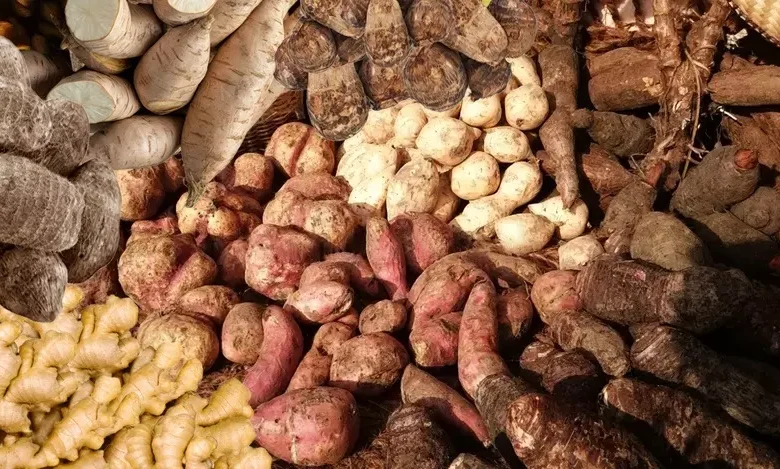Root Crops: Vital to Agriculture and Food Security

Root crops are central to Dominica’s agriculture, economy, and cultural identity. These nutrient-rich crops thrive in the island’s fertile volcanic soils and tropical climate and are crucial to food security, local traditions, and export markets. Dominica’s diverse topography, characterized by mountains, rivers, and valleys, supports the widespread cultivation of root crops across villages such as Wesley, Salisbury, Castle Bruce, Marigot, and La Plaine.
Varieties of Root Crops in Dominica
Dominica boasts a diverse range of root and tuber crops, including:
- Dasheen (Colocasia esculenta): A staple for domestic consumption and export. Approximately 900 metric tons of dasheen were exported in 2022, primarily to the Caribbean and North America.
- Yams (Dioscorea spp.): Cultivated extensively in areas like Belles and Grand Fond, yams are versatile in many traditional dishes.
- Cassava (Manihot esculenta): A root vegetable known for its by-products, such as bread and starch. It is grown in communities such as Sineku and other hamlets in the Kalinago Territory.
- Tannia (Xanthosoma sagittifolium): Often called the “hidden gem” of Dominica’s root crops, tannia supports food security and contributes significantly to export markets.
- Sweet Potatoes (Ipomoea batatas) are prevalent in local cuisine and international markets. They are valued for their nutritional benefits.
- Eddoes (Colocasia antiquorum): A smaller variety grown alongside dasheen, eddoes are enjoyed in soups and stews.
- Ginger (Zingiber officinale): A vital cash crop with medicinal properties, grown mainly in La Plaine and Bellevue Chopin.
Economic Importance and Export Data
Root crops form a cornerstone of Dominica’s agricultural economy. In 2022, root crop exports contributed approximately USD $3.5 million to the island’s GDP, with dasheen and tannia leading the pack. Support from organizations such as the Dominica Export Import Agency (DEXIA) and the Caribbean Agricultural Research and Development Institute (CARDI) has improved export quality and market access.
The Ministry of Agriculture, Fisheries, Blue and Green Economy supports farmers through training programs, subsidies, and access to better farming equipment. Collaboration with international partners like the Food and Agriculture Organization (FAO) has further strengthened the sector.
Food Security and Nutritional Benefits
Root crops are essential for food security in Dominica, offering a reliable source of carbohydrates, vitamins, and minerals. Cassava and tannia are drought-tolerant, making them vital in the face of climate change. Sweet potatoes, rich in beta-carotene, and dasheen, a good source of dietary fibre, are crucial for combating nutritional deficiencies in local communities.
Root crops are celebrated during World Food Day and the Farmers and Fishers Recognition Ceremony, highlighting their importance to Dominica’s heritage and economy. The government’s push for organic farming has also boosted the reputation of these crops in global markets.
Challenges and Sustainable Solutions
Farmers face challenges such as pests, diseases, and the impacts of extreme weather events. The 2015 Tropical Storm Erika caused significant losses in root crop production, followed by similar devastation from Hurricane Maria in 2017. Recovery efforts, supported by international donors and local initiatives, have helped stabilize production.
Projects like the Climate Resilience Execution Agency for Dominica (CREAD) focus on improving irrigation systems and introducing pest-resistant crop varieties. These measures aim to ensure sustainability and increase productivity for smallholder farmers.
Future Prospects and Innovations
The demand for root crops in international markets continues to grow. Value-added products like Dasheen chips, cassava flour, and ginger tea are gaining popularity, creating opportunities for the agro-processing sector. The Organic Dominica Initiative seeks to position Dominica as a global leader in organic root crop farming, catering to health-conscious consumers.
Collaboration with entities like the FAO, DEXIA, and CARDI ensures that Dominica remains competitive in regional and global markets. Thanks to investments in research and development, training programs, and modern farming practices, Dominica’s root crop sector is poised for significant growth.
A Resilient Foundation
Root crops are not only agricultural commodities; they are a lifeline for Dominica’s rural communities and a symbol of resilience. As the island continues to navigate challenges and embrace sustainable practices, root crops remain a steadfast pillar of Dominica’s agricultural and cultural landscape.




